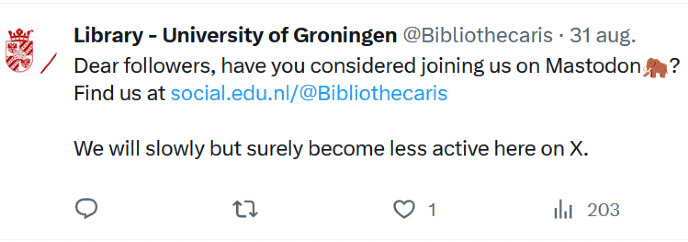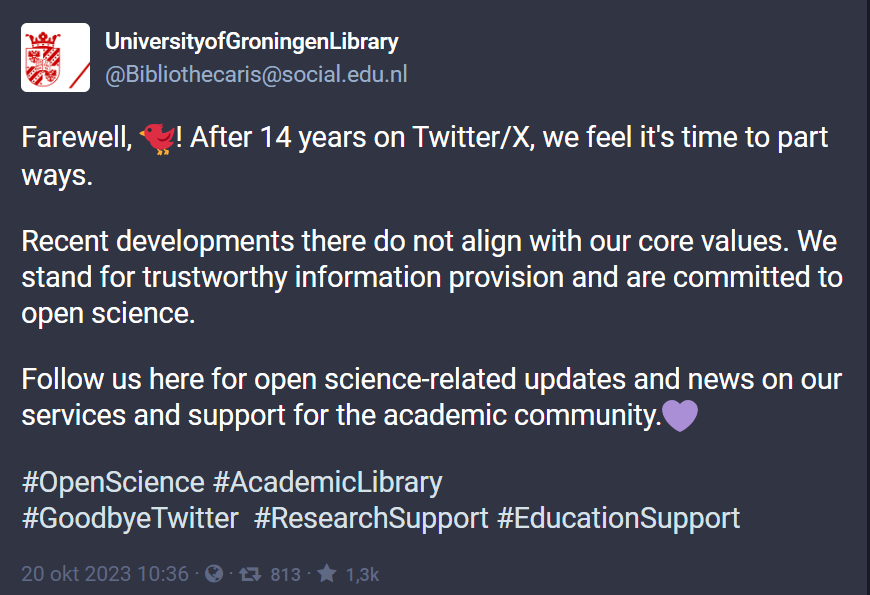One year after X: Embracing open science on Mastodon
| Date: | 23 October 2024 |
| Author: | Babette Knauer |

Introduction
In October 2023, the University of Groningen Library (UB) made the decision to leave X (formerly Twitter) and fully transition to Mastodon, a decentralized, non-commercial social media platform. This move, prompted by growing misalignment with X’s commercial interests and ethical dilemmas with regard to our core values as a public organization, marked a significant shift in our approach to digital communication. The transition was met with enthusiasm. It allows us to practice what we preach, aligning our communication with the open science principles we advocate, while at the same time leading to deeper engagement. In this case study, we reflect on the reasons behind our switch, the challenges faced, and the key lessons learned. We hope to offer insights and inspiration for other academic institutions considering making the switch to Mastodon.
The paradox of open science communication
As an academic library, we have long been at the forefront of the open science movement, providing crucial infrastructure and support for researchers. We have developed strong expertise in open access publishing, open education, and FAIR data management. In regard to our communication tools, however, we recognized a paradox: while advocating for openness and transparency in research, we, like many academic institutions, relied on closed, commercial social media platforms for our communication.
The 'enshittification' of digital spaces, a concept coined by Cory Doctorow, describes the deterioration of online platforms as they prioritize profit over user experience. This phenomenon is increasingly relevant for social media use in academia, where platforms often rank engagement over accuracy, potentially undermining the principles of transparency and objectivity central to open science. Opaque algorithms can hinder rational debate and create echo chambers, which are antithetical to the academic pursuit of knowledge. Just as commercial social media platforms have been corrupted by profit-driven interests, academic online spaces – intended for open discourse and nuanced debate – face similar threats, including the amplification of sensationalism over thoughtful discussion.
Our decision to switch
Recognizing these challenges, we realized that supporting academic staff in their open research and teaching practices while developing an open communication strategy requires a credible approach that ensures digital autonomy and self-determination. This realization prompted our decision to switch to alternative platforms that better align with academic values and the pursuit of knowledge.
Our decision to leave X was driven by several factors:
-
Our growing discomfort with the platform's direction and ethical dilemmas that misaligned with our core values of openness and trustworthy information provision
-
Rising misinformation and harassment of researchers, which created a toxic environment hindering constructive academic discourse
-
Our need to align our communication strategy with our core values as a university library
-
Calls for greater digital sovereignty in the public sector, which resonated with our mission as a public institution
-
Algorithmic limitations to reach our target audience on X, indicating a need for a fresh approach

We identified Mastodon as an ideal alternative, offering a decentralized, community-driven nature that aligns perfectly with our open science principles. As a non-commercial platform, Mastodon presents a sustainable model that resonates with our values and fosters openness by allowing diverse communities to set their own moderation policies.
Planning and executing our transition
We carefully planned a gradual transition to retain our audience and…
-
began cross-posting on both platforms to maintain our presence while introducing our audience to Mastodon during November 2022 and October 2023
-
realized that our content resonated more strongly with Mastodon users than X followers
-
gradually reduced our activity on X to signal our shift in focus
-
openly communicated with our audience about the impending change, explaining our rationale and guiding them on how to follow us on Mastodon
-
adopted social.edu.nl as our new home base, a Mastodon instance set up by SURF (the ICT cooperation for Dutch education and research organization)
-
set 20 October 2023, as our official 'cut-over date', with the International Open Access Week theme "Community over Commercialization" serving as catalyst.
The impact of our switch
Our transition to Mastodon was met with overwhelming enthusiasm and support, particularly from the Mastodon community. Within one weekend, we gained approximately 900 new followers, and our #LeavingTwitter post received 1,300 likes and around 800 reposts. This immediate growth and engagement, particularly the encouraging (qualitative) responses, surpassed our expectations and validated our decision.
A quick follower analysis revealed a significant shift from a primarily local audience on X to a diverse international one on Mastodon. Our followers include academics from various disciplines, open science and open-source enthusiasts, library professionals, historians, and advocates for a better online ecosystem. This broadened reach has opened up new opportunities for collaboration and knowledge sharing.

Redefining our content strategy
Our transition prompted a reevaluation of our content strategy. We recognized that Mastodon's design emphasizes peer-to-peer interactions. Furthermore, we considered the broader context of the open science movement, which is inherently community-driven.
This led us to realize that our former, rather traditional strategy of broadcasting information was not leveraging the platform's interactive nature. We also believe that a top-down communication approach is at odds with the collaborative ethos of open science. This motivated us to align our content strategy more closely with the participatory nature of both Mastodon and the open science community.
By adapting our approach, we aim to foster more engaging dialogues, encourage community participation, and better reflect the collaborative spirit of open science in our communications.
Our new strategy integrates open science as the central theme, featuring for example:
-
A recurring series highlighting open access publications across disciplines, showcasing the breadth and impact of open research presented by their authors
-
In-depth interviews with academics sharing their experiences with open science practices, such as open access publishing, FAIR data management or teaching concepts using open educational resources, offering practical insights for academics worldwide
-
Presenting digitized material from our Special Collections, ensuring open accessibility and bringing rare and valuable resources to a global audience
-
Highlighting new open access acquisitions from our library collection
-
Sharing tools, tips and tricks applicable to researchers everywhere, not just locally or in the Netherlands
We are also working on a research project to investigate the motivation and patterns of (non)usage, challenges faced, and potential benefits perceived by academics who use Mastodon for professional purposes. This will help us to better understand how we can serve the academic community on this platform.
Navigating a new landscape
Unlike X, Mastodon does not offer detailed analytics due to privacy considerations. This can present a challenge if one is accustomed to traditional metric-focused approaches. We decided to embrace this change, focusing on content quality and community interaction rather than chasing numbers.
Despite the lack of detailed analytics, we are observing a significant growth and reach on Mastodon. Since November 2022, we have built a community of more than 1,970 [Update 26 Feb 2025: 2,645] followers compared to 2,700 followers we had on X (2009-2023).
In the pre-Musk era on Twitter, even our most popular posts barely reached an average of 1,500 to 2,000 views. Although, on Mastodon, we cannot determine how many users will have seen any specific post, our top-10 performing posts on average reached nearly 52,000 accounts through our own followers and the followers of those who shared them; with an overall average reach of about 6,800 accounts per post (based on our around 200 posts published in the period 10/2023-10/2024). Some recent toots even succeeded beyond our expectations with a potential reach of almost 224,000 accounts.
However, these numbers, while notable for a university library, are secondary to the quality of interactions. Users thoughtfully respond to our posts and questions, offering valuable insights. The community provides constructive feedback, creating a collaborative learning environment. Through these interactions, we gain new perspectives and knowledge, enriching our experience on the platform.
Conclusion: Practicing what we preach
Our transition to Mastodon allows us to practice what we preach, aligning our communication methods with the open science principles we advocate. We joined a vibrant, international community and also reinforced our role in fostering a digital, democratic space for the academic community. Our experience underscores the importance of an open science-driven communication approach that is transparent, meaningful, and dialogue-oriented.
Institutions must carefully weigh platform transitions, including potential short-term reductions in reach and engagement. However, by aligning digital presence with core academic values, organizations can build deeper trust and foster more meaningful connections with their communities – outcomes that ultimately matter more than raw follower counts.
For organizations committed to open science, embracing such changes is both a necessary and rewarding endeavor, paving the way for more sustainable, values-driven academic communication while encouraging collaborative knowledge exchange.
As we look to the future, we remain committed to exploring innovative ways to advance open, ethical science communication. Through these efforts, we hope to inspire other academic institutions to join in building a more transparent, collaborative, and resilient academic digital ecosystem.
About the author
Babette Knauer is team leader Communications at the University of Groningen Library.


